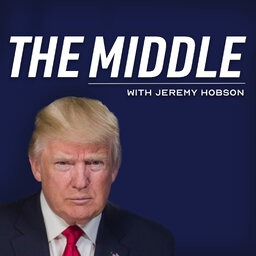Is Bipartisanship Still Possible?
In this episode of "The Middle with Jeremy Hobson," we explore whether or not bipartisanship is still possible in today's political climate. Jeremy is joined by former Republican Governor of Indiana Mitch Daniels and Democratic Congressman Don Davis of North Carolina. The Middle's house DJ Tolliver joins as well, plus callers from around the country.
In 1 playlist(s)
The Middle with Jeremy Hobson
The Middle with Jeremy Hobson is a national call-in talk show focused on bringing the voices of Amer…Social links
Follow podcast
Recent clips

The Follow Up: Fear in Trump's First Year, Michigan and the Midterms
22:56

One year of Trump: How are His Policies Affecting You?
49:39

The Follow Up: Minneapolis, Maduro’s Capture, and the First Days of Mamdani
26:52
 The Middle with Jeremy Hobson
The Middle with Jeremy Hobson